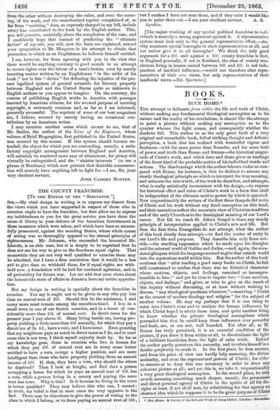THE COUNTY FRANCHISE.
[To THE EDITOR OF THE " SPECTATOR."] SIR,—My chief design in writing is to express my dissent from the views which you have supported in respect of those who in counties ought to have the franchise, but first allow me to express my indebtedness to you for the great service you have done the cause of liberty in your defence of the American Government in those measures which were taken, and which have been so success- fully prosecuted, against the seceding States, whose whole course of acting was so thoroughly opposed to the eternal principles of righteousness. Mr. Johnson, who succeeded the lamented Mr. Lincoln, is an able man, but it is deeply to be regretted that he does not see his way to give to the freedmen equal rights. That meanwhile they are not very well qualified to exercise them may be admitted, but I have a firm conviction that it would be a less evil to give than to withhold them, for if equal rights are with. held now, a foundation will be laid for continual agitation, and in all probability for future war. Let me add that your views about the lamentable state of affairs in Jamaica have my entire approba- tion.
But my design in writing is specially about the franchise in counties. You say it ought not to be given to any who pay less than an annual rent of 201. Should this be the minimum, I and many more mast remain among the unenfranchised. I live in a Small town in one of our Scotch counties, and in a house of con- siderably more than 101. of annual rent. In direct taxes for the present year I pay above 61. Many living beside me, having pro- perty yielding a little more than 10/. annually, for which they pay a direct tax of 3a. 4d., have a vote, and I have none. Even granting that my neighbour pays as much in direct taxes as I do, and in most cases this is not true, I think myself unjustly dealt by. So far as my knowledge goes, those in counties who live in houses for which they pay 101. of annual rent are in every sense better entitled to have a vote, occupy a higher position, and are more intelligent than those who have property yielding them an annual income of 10/. If, then, they have a vote, why should the others be deprived? Then I look at burghs, and find that a person occupying a house for which he pays an annual rent of 10/. has a vote, while a person living in a county and paying the same rent has none. Why is this? Is it because he living in the town is better qualified? They may believe this who can, I cannot ; in truth, my belief is that in most cases the very opposite is the fact. There may be objections to give the power of voting to the class to which I belong, or to those paying an annual rent of 101., but I confess I have not seen them, and if they exist I would like you to point them out.—I am your obedient servant, A. S. Ayrshire.
[The unjust working of any spacial political franchise to bull; viduals is scarcely a strong argument against it. A representative system must look only to the general representative effect,—else why nominate special boroughs to elect representatives at all, and not rather give it to all boroughs ? We think the only good argument for a 201. and against a 101. county franchise is that, in England generally, if not in Scotland, the class of county non- electors living in houses rented between 101. and 201. is not inde- pendent of landlord influence,—would not therefore elect repre- sentatives of their own views, but only representatives of their landlords' views. —En. Spectator.]


































 Previous page
Previous page